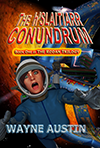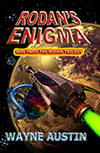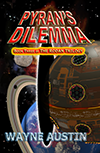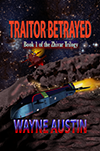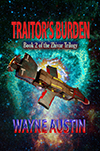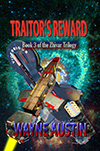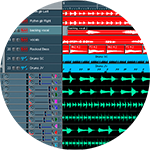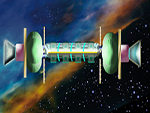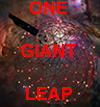
Design Flaw
By Wayne Austin
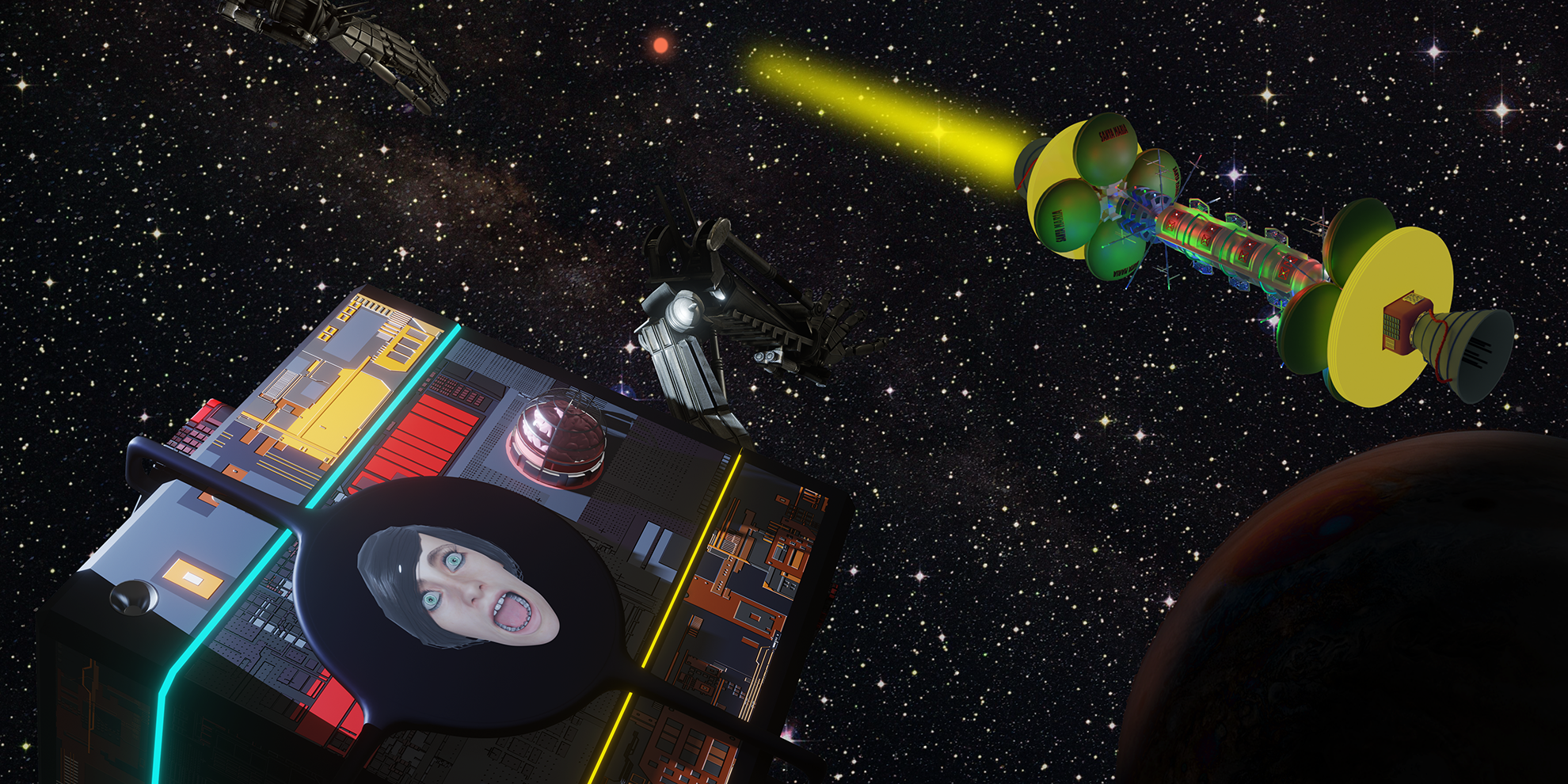
Oblivious to the sun-lovers frolicking along the shore, a flock of orange and purple-crested Skraa Flakers, from the fourth planet around Peronda’s star, swooped and flittered over glittering breakers, yelping and snorting as they played on the thermals before spiraling up toward the rainbow sky that complemented the crystal blue water. Mark Caldosa stared out and basked in the perfect harmony. Day in, day out, he never tired of the scene.
Happy people, his people, enjoying paradise.
A dozen or so of the Santa Maria’s living crewmembers cavorted amongst the Skraa Flakers, darting to and fro, twisting and wheeling like playful seals amidst a shoal of nervous fish. The living were always more adventurous and outgoing than the dead. And argumentative. Mark had been like that once, before he died. His mood soured and a feeling niggled at him. There was something.... But the thought refused to come out into the open. It had to do with his death on Vermis, the second planet around NKY 1387, Aarondson’s star. He had always meant to ask Alisha and find out exactly what had happened. Then his mood lightened, and the dark thoughts fled like they always did.
Instead, his thoughts turned to NKY 6479, Menadue, the Santa Maria’s destination, and he felt his excitement build. For nine hundred years the Santa Maria had coasted at one-tenth the speed of light on this leg of its twenty thousand-year search for knowledge, life, and intelligence. Such a noble quest; it warmed his heart to think that he was in charge of this great undertaking—
A sharp voice cut through his revelry and was answered by a shrill snap as a man and woman strode into view and stopped to continue their argument.
Mark frowned as their strident voices marred the harmony. Now that NKY 6479 was within reach, Jarsin Felding and Morgan Pierson were at it again. He had hoped their simmering feud would have petered out after all these centuries, but apparently it had just remained dormant, ready to erupt at the slightest excuse. Perhaps he should step in and nip this in the bud, but how could a small cup bail out a ship determined to sink? He sighed as they stood toe to toe at the edge of the sand on the other side of the boardwalk, Jarsin batting Morgan’s hand away as the blonde firebrand stood on her tiptoes, all the better to jab her finger and drive home her point into his dark-skinned chest.
So much trouble, the two exobiologists were the youngest crewmembers, ex-lovers, and now bitter rivals. Yet they couldn’t leave each other alone. Why couldn’t they be dead? They very nearly had been, after their little escapade back at Saccarus Omicron.
Only his intervention had saved them. Though Alisha had disagreed, she had complied in the end.
Mark shrugged as he watched the pair. Why did the living have to be so excitable? So hyperactive or agitated? And so willing to take stupid risks? It wasn’t that bad being dead, or “virtual” to use the correct term. The dead always stayed calm and relaxed, unruffled by any dramas around them, and were so much easier to manage. Almost half the crew had died, each replaced by a virtual based on engrams that were always recorded prior to away missions. Almost half.... His frown deepened as he toyed with the thought.
That many? And they were only a quarter of the way through their mission.
The niggling feeling returned. He really should ask Alisha to give him access to the records of his last EVA. Just to satisfy his curiosity if anything.
But the feeling drifted away. Maybe some other time. It wasn’t important. After all, he had six thousand people to manage. Jarsin lifted off the ground, rising toward the Skraa Flakers, and Morgan followed. They spiraled around each other, still arguing, and as their voices faded into the distance the harmony returned to comfort Mark.
“Excuse me, Mayor.” A soft, feminine voice broke his reverie. “I must speak with you.”
With a twist of his mouth into a wry smile, Mark turned away from the window and sat down at his desk. “Of course, Alisha.”
A svelte woman materialized before him and he studied those piercing black eyes, never happy or sad, full of infinite intelligence but not infinite patience as the stern look on her snow-skinned, elfin face now testified. Here was more trouble to mar his day. As if to accent his souring feeling, the monochrome intensity of her terse haircut and matching bodysuit cut against the lively decor of his office. For some reason he couldn’t fathom, the ship’s avatar liked black, the color of death.
Next to her, Karla Fremmel and Simon De Laine, the chief astrophysicists, and Sunil Pattel, chief systems theorist, popped up, side by side. Unlike the two men, who radiated solemn concern, Karla looked like she was about to burst into tears at any second. She stormed forward, planted both hands on Mark’s desk and leaned over to confront him. The intensity of her gaze made his pulse quicken.
“You have to do something! Order Alisha to start braking.”
Mark opened his mouth to begin a consoling spiel, and then stopped. “What are you talking about?”
“They think that I am blind,” Alisha said in a voice that dismissed the allegation.
Karla straightened and turned to face her. “But you are! We’ve shown you proof; the external sensors aren’t working. Why can’t you accept the facts?”
“Mayor,” Simon stepped around Karla, “we have two problems.”
“Emergencies!” Karla snapped.
“Only one is an emergency,” Sunil said in a soothing voice.
“There is no emergency,” Alisha countered. “Diagnostics reports that there are no problems. The Santa Maria functions within specification.”
“That’s because Diagnostics is as blind as you are!” Karla turned to appeal to Mark. “Mayor, we must start emergency braking. Now! We’ve missed our braking point by twelve years. We are in Menadue’s system already.”
“And we’re on a collision course with the star,” Simon added in a grave voice.
“No, we are not. Our braking point is two years away. The Santa Maria is on course and on schedule.”
With a directed thought, Mark checked the ship’s status and found nothing amiss. “I have to agree with Alisha.” He held up a hand to forestall Karla. “Even if the Santa Maria’s sensors aren’t working, according to the date, we’re about two years from braking.” An image appeared at the end of his desk, and he considered the smattering of stars. “I don’t see anything wrong with this. It looks like some sensors, at least, are working fine.”
He offered his most disarming smile to Karla and then leaned back in his chair and shrugged his eyebrows at Alisha. To think that the Santa Maria’s personality could be wrong was preposterous. Sometimes the dead made mistakes and quite often the living did. But never Alisha. The crew’s existence depended on her.
Karla closed her eyes and her lips trembled as she sucked in a deep breath. “Mayor,” she said in an almost inaudible voice, “do you think we are stupid?” She opened her eyes to glare at him. “Or irresponsible?”
Simon tugged at her arm. “Karla. I’m sure the mayor doesn’t think that. And,” he looked across at Alisha, “once he has heard our argument and seen our proof, he’ll have to agree with us.”
“What you call proof, I call misinterpretation.”
“You can’t misinterpret a supernova!”
“My external sensors have not detected a supernova and there isn’t one predicted for another twelve years. Either the fault is in your equipment, or you have detected an anomaly and misinterpreted that.”
“There is no anomaly,” said Simon.
“And there’s only one theory that makes sense,” said Karla.
Sunil hovered behind Simon with a bemused, almost apologetic smile on his face. “It’s fascinating. I’ve discovered a design flaw in the Santa Maria.”
Alisha scowled at him. “There is no flaw. Design or otherwise.”
Mark sat back and tapped his lips. He looked at Alisha and then at Sunil and pondered this conundrum for a moment. “My first thought is to agree with Alisha. I mean ... we’ve been on this mission for what, nearly five thousand years? If there were any design flaws—and I find that hard to believe—wouldn’t they have shown up ages ago? Anyway, the Santa Maria is designed for continual improvement. It’s supposed to get better with age, not worse.”
“Thank you, Mayor.”
“But it would be remiss of me not to hear out Simon and Karla. I doubt they would make such allegations based on shaky logic.”
Alisha’s calm composure hardened.
“Thank you,” said Simon. “If I may?” he asked Karla.
She nodded. “Just keep it simple—oh!” A look of horror crossed her face and then she beamed an embarrassed smile at Mark. “I didn’t mean ... it’s just that there is some very complex physics involved and, oh, you know what I mean.”
“Let me explain,” said Simon. “A few hours ago, our neutrino detectors picked up a strange signal—”
“Like a Type II supernova,” Karla cut in, “only compressed. In time that is. Oh, sorry. Go ahead, Simon.”
“We didn’t know it was a Type II supernova at first—”
“Some of us picked up on it straight away,” said Karla. “You just had to look at the micro-structure within the spectrum.”
“This only reflects on a human design flaw,” said Alisha. “The human brain is designed to find patterns, sometimes where none exist. And that is the case here. I cannot see any relationship between the detected spectrum and that for a Type II supernova. Therefore, there is no relationship.”
Karla squeezed her lips into a thin line and her brow furrowed in anger. “But you’re not an astrophysicist, you’re nothing but glorified wetware with pretensions to being intelligent—”
“Karla!” Mark snapped. For the life of him, he couldn’t figure what it was with the living. First Jarsin Felding and Morgan Pierson and now Karla Fremmel ... they were so easily agitated. The silence sizzled with tension until Simon broke the ice.
“I must admit, when the external sensor logs showed nothing, I was skeptical as well.”
“Which is more proof that you are all wrong.”
“Except,” Karla’s voice oozed venom, “the ratios between the electron, muon and tau neutrinos over the range of emission energies match the predicted neutrino oscillations for NKY 17538—it’s a blue giant, 14,000 light years away. But only if we are at Menadue. And more than that, we delved back into the recent past and noticed some inconsistencies.”
Mark sat up and leaned forward. “What do you mean?”
“When the supernova didn’t show up on the external sensors, I set a couple of astronomers to work analyzing the sensor logs.”
“And that’s where I come in,” said Sunil. “Karla called me in to check their results.”
“They found some things that didn’t add up,” said Simon.
Karla nodded. “Inconsistencies with known variable stars, Doppler analysis of stars with planets, they all followed model predictions exactly. And I mean exactly. One hundred percent! But by its nature, data is never that perfect.”
Sunil squeezed his lips into a thin smile. “That is true. Some of the systems are chaotic and it should be impossible to simulate them accurately, but there are no corrections.”
Mark drummed his fingers on his desk and then sat back to look at Alisha. He didn’t doubt her for one second and yet Simon and Sunil weren’t the type to make rash statements without considerable arguments to back them up. But when it came to making two sides see eye to eye, the art of dispute resolution was in compromise. “What if they are right? Won’t braking now only delay us a couple of years if they’re wrong?”
Alisha folded her arms across her chest. “I cannot do that. If I begin braking now, I will use up my fuel reserves to reach Menadue and have nothing to maneuver with when we arrive, in which case we will be stranded. I cannot jeopardize the Santa Maria or the crew.”
Karla’s brow furrowed as she glared at Alisha. “But we must start emergency braking now!”
“Emergency braking will leave us further stranded. We would miss Menadue entirely. It is out of the question.”
“But we’ve shown you the proof,” said Simon. “What more do you want?”
“Your interpretation does not agree with the data from the external sensors.”
“That’s because they aren’t working!”
“Diagnostics reports that they are.”
“Diagnostics is unable to detect the problem,” said Sunil, “because of the design flaw.”
“There is no design flaw.”
Mark stood and held up both hands. “Enough. We’ve been through this. Sunil, please, what is this design flaw?”
“There is no design flaw,” Alisha repeated.
“Please, let me hear what Sunil has to say.”
“The problem began back in Saccarus Omicron,” said Sunil.
“The comet? But I thought it didn’t do any damage.”
“Diagnostics reported no damage,” said Alisha.
“Actual damage and damage reported are two different things,” said Sunil. “Diagnostics only reports damage when a component operates outside its tolerance. When the Santa Maria passed through the comet’s tail all external sensors were damaged.”
“That is incorrect,” said Alisha. “Dust grains did etch the optical surfaces of the detectors and hydrocarbon ices left an oily veneer, but not enough to degrade performance.”
Sunil’s face broke into a grin, like he was about to deliver the coup de grâce. “But each sensor continually compares its output with its neighbors. If it is still operating within its tolerance and there is a discrepancy, it generates a predicted model from its neighbors and then adjusts its output to match that model. Then it checks with its neighbors again. However—”
“Except,” Karla cut in, “its original modeled results were based on its neighbors’ data before they corrected themselves and so, when it checked again, after its neighbors had adjusted, it saw that it had overcompensated and so it reduced its raw signal again.”
“But its nearest neighbors were also doing this as well,” added Simon.
Alisha’s mouth tightened a fraction and she glanced at Mark as if to say that they were stating the obvious, so what was the point? “That is how the Santa Maria continually improves. All systems continually check their outputs against their neighboring systems and adjust if necessary. That’s how they maintain optimal performance.”
“And there is the flaw!” Sunil smiled in triumph as he held up a pointed finger. “Because most sensors were affected, it created a feedback loop of reassessing and then compensating for a perceived signal loss which was caused by the modeled predictions continually changing.”
“You could say they were out of phase,” said Simon. “Normally, each sensor can rely on its neighbors to help it compensate and remain optimal as they are presumed not to be affected, but the designers, both human and AI, didn’t perceive that all sensors could be adversely affected at the same time.”
Karla shook her head in disbelief. “They never imagined that the Santa Maria would dive through a comet’s tail.”
A model of the Santa Maria appeared over Mark’s desk and the external sensors showed as an even spread of bright green dots over the kilometer-long, cylindrical crew module and the fusion engines at each end. Only the large, perpendicular disks of the heat radiators that sat between each engine and its ring of four fuel spheres weren’t studded. He admired the elegance in the simplicity of the ship’s design.
“Watch,” said Sunil. “This shows the differences between data and simulation that the detectors produced just before we arrived at Saccarus Omicron. This is of course, speeded up.”
Speckles of color, a riot of noise, appeared and danced over the Santa Maria’s surface.
“And now, as we leave.”
A faint dull wave washed over the Santa Maria. It reflected and a myriad of ripples flowed back and forth, the colors dissipating and growing dimmer with each reflection. The Santa Maria faded to black.
“The flaw!” Sunil announced. “Thousands of tiny adjustments over less than a century have caused a ship-wide degradation of the external sensors to a point where they only register noise, which is filtered out.”
Simon nodded sagely. “And thus, since each sensor detects no change, it reports what it expects.”
“This is pure speculation,” said Alisha. “Sunil, I am surprised at you, drawing a conclusion like this from dubious data.”
Mark scratched his head and brushed his long white hair back into place as he considered his options, then he saw the flaw in their argument. “Even if you are right,” he said to Karla, “why would the Santa Maria be running behind schedule?”
“The internal clock is running slow.”
“Diagnostics disagrees.”
“Diagnostics would!”
“Karla.” Simon patted her arm to calm her.
“The explanation is simple,” said Sunil. “Since the internal clock’s accuracy drifts over time, it monitors several pulsars. If the measurements vary from predictions, the clock adjusts its frequency. But since each external sensor is returning its internal modeled result, the clock doesn’t know it has drifted. The result is that we accelerated for a little longer than we should have. We have been coasting along at a slightly higher velocity.”
“And that’s why we have to brake!”
Simon nodded to agree with Karla.
Without actual data, they were guessing, but if they were right.... Mark looked at Alisha. “Why don’t you reinitialize all the sensors?”
“It would be pointless, and the Santa Maria would lose five millennia worth of continual improvements.”
“What is wrong with you?” Karla snapped as she struggled to break free of Simon’s grip.
“But what if it shows they’re right?” Mark asked.
“Logic dictates that they are not.”
“Your logic!” Karla sneered. “This is ridiculous. Why can’t you override her?” she asked Mark.
Sunil cocked his head and pursed his lips. “The designers felt that the only time the human crew might want to overrule Alisha would be in an emergency and they felt that in such situations the crew might make a bad decision. Possibly fatal.”
“Another flaw,” Karla muttered.
Mark sat back and rubbed his cheek as he stared at Alisha. “I do have one option.”
“I would not advise it,” said Alisha. “At our current velocity, even a tiny particle would destroy a unit on impact.”
“An EVA?” Sunil asked. Mark nodded.
Karla hesitated. “Who?” she asked.
“It has to be someone living.” Simon patted her arm again and gave her a consoling smile.
“No!” She blanched and pulled back. “I mean ... I’ve never been on an EVA.”
Mark stood up as he made his decision. “Relax, Karla. I need experienced people and I have just the right pair in mind. Jarsin Felding and Morgan Pierson,” he called out. “Please join me. They are my chosen—” he uttered a dry chuckle, “volunteers.”
“Is that wise?” Alisha asked.
“Uh, oh!” Sunil rolled his eyes. “What a terrible choice.”
“Who else is there? I can’t go, I’m dead. Besides, Jarsin and Morgan are the cause of our predicament—indirectly I’ll admit—so they are the perfect volunteers to resolve this problem.”
“But they hate each other.” Alisha folded her arms across her chest and frowned. “Jarsin still accuses Morgan of trying to kill him.”
Mark shrugged. “The inquest found no evidence of that. When the vent erupted from the comet and almost hit them, she appeared to panic and crash into him.”
“And I went through the comet’s tail after them when you insisted. A mistake on my behalf.”
“They would have died, otherwise.” And perhaps they should have; Alisha’s stern countenance said as much. Mark offered her a rueful smile as he considered the consequences of his decision, but then hindsight was a double-edged sword and management wasn’t about second-guessing. At the time, he had made the right decision for the right reasons and that was all that mattered. “In a way, I feel sorry for Jarsin. He was so certain he would find evidence for his theory in that comet. Ah, here they are now.”
The pair blinked into existence, next to Alisha.
“What has he accused me of now?” Morgan demanded. She turned to glare at Jarsin. “You never stop, do you?”
Jarsin slapped a hand to his chest as if mortally wounded. “Me? I’ve done nothing. It’s you who stoops to underhanded means.” He looked from Alisha to Mark for confirmation. “I mean, who in their right mind believes that the same basic structure for life, the very same amino acids and nucleotide bases, just form all on their own in every star system found to have life? It’s ludicrous!”
“That’s what the laws of physics and chemistry dictate. And it’s not as ludicrous as postulating that interstellar comets have seeded those star systems. Where are all these comets? And how did they come to have the seeds of life within them? Tell me that! Interstellar Panspermia? It’s an old idea that’s been thoroughly discredited. Only imbeciles believe in it.”
Jarsin’s eyes narrowed to slits. “I would have had my proof if it wasn’t for you,” he snarled, his voice as cold as the interstellar void. “That comet was passing through Saccarus Omicron for the first time. It was the ideal candidate. My scans showed hints—”
“And so you went to find out for yourself,” Mark cut in, “and you,” his gaze pierced Morgan, “had to go along to make sure he didn’t cheat.”
“No, she went along to make sure I never gathered any corroborating data.”
“That’s not true! You—”
“Enough!” Karla snapped. “The Santa Maria is in danger.”
“And that’s why you’re here,” said Mark, “to fix a problem both of you created by your actions.”
Morgan’s eyes grew wide, and her face fell as Mark finished his briefing. “An EVA?” She hugged herself and hunched her shoulders, looking more like a frightened child. “With him?”
“I’ll go,” Jarsin said in a defiant voice as he glanced sideways at Morgan. “Alone.”
“No,” said Mark. “Safety protocols require at least two persons per EVA. Besides, it’s time both of you learned to work as a team again now that we’re approaching a new system.”
Mechanical hands slid the silver cylinder, holding Jarsin’s brain, into the circular opening on top of the life support cube’s squat, rectangular body and the cube lifted off. The EVA shouldn’t take long and yet Mark couldn’t brush off a disconcerting feeling. Could Alisha really be wrong?
“We should decorate this place,” Jarsin joked as his new body turned and scooted past the line of crew storage compartments. “You know, some bright colors, a mural perhaps. And some life-sculptures—”
“Hurry up!” Morgan snapped as he slowed to a stop next to her. “This stupid reality nearly killed me the last time. Let’s get this over with.”
“Touchy,” said Jarsin, then his voice became cold and hard. “Just keep out of my way. I’ll be monitoring you.”
“That’s enough,” said Mark and he had to admit that his hope for them learning to work together was a tad naive. Was that another mistake? How many had he made without realizing.... It was always the little mistakes, ignored or missed, that in retrospect led to tragedy. He pursed his lips. What string of stupid little mistakes had led to his demise? At least in death he could learn from them if only Alisha would give him access—
With a scowl he brushed the thoughts aside before dwelling on them became another mistake. He stared at the EVA feeds and forced himself to concentrate.
Together, Jarsin and Morgan turned to face a large square opening with nothing but space beyond. Side by side, the two cubes drifted up and docked in a perfect fit with their EVA units. Small jets of gas flared.
As Jarsin and Morgan drifted free of the Santa Maria, Mark chewed on his lower lip. Just a few minutes was all they needed.
Jarsin moved away and rose over the great ship. Morgan waited before following. As Mark watched the two feeds, hovering together over his desk, he realized he was clenching his fists. Had he made the right decision? Jarsin cleared the top of the Santa Maria and Menadue’s dim yellowish dot rose into view, far brighter than it should have been. Mark felt the tension drain out of him. He had. Then Jarsin pivoted and zoomed in on a dim reddish disk that began to shrink as the Santa Maria sailed past. A sick feeling overwhelmed Mark. The orange and brown-banded gas giant was the planet that bounded the inner region of Menadue’s system.
“There!” Karla clapped her hands and turned to gloat. “There’s your proof!”
“I do not understand.” A slight quaver distorted Alisha’s voice. “I cannot detect Jarsin or Morgan. The external sensors must not—” She froze.
Another Alisha popped into existence, but this one lacked any emotional context.
“Diagnostics?” said Sunil. “What are you doing?”
“I have detected an anomalous emotional state in the Santa Maria’s personality,” Diagnostics said in a flat monotone. “This system has concluded that the external sensors are not working and issued a command that endangers the Santa Maria. Until the fault is rectified, it will stay offline.”
Mark jumped to his feet. “You overrode Alisha’s decision to brake?”
With a confused frown, Karla turned to Sunil. “I thought Alisha was in control.”
“Think of Diagnostics as the ship’s doctor. I’m afraid it thinks the ship’s captain is not fit to command.”
“Diagnostics, look!” Mark pointed to the data feeds from Jarsin and Morgan. “We are inside Menadue’s system. Issue the command to start braking.”
“External sensors indicate that we are two years from our braking point.”
“But see there? That’s—”
“The external sensors do not—”
“Oh!” Karla snapped. “It’s even more blind than Alisha.”
“I’m coming in,” said Jarsin.
“No,” Mark countermanded although every second they were out there was fraught with danger, but the answer to his dilemma was out there too. He just hoped it was the right decision.
“Why not?” asked Jarsin.
“There is no point in leaving them out there,” said Simon.
“I don’t want to stay out here,” Morgan whined, her voice trembling.
“Stay there.” Mark licked his lower lip as he regarded Diagnostics. “If the Santa Maria will only accept data from its external sensors, maybe we can make one see Menadue.”
Jarsin drifted closer to the Santa Maria’s surface and shone a light across the closest sensor pod, a two-meter wide ovoid. “I can see a faint film covering it. How’s this?” He turned up the spotlight’s intensity to a blinding glare.
“There’s no response,” said Sunil. “It’s the pre-processor sub-system after the bi-optronic array that is the problem.”
“All bi-optronic arrays are operating within operational tolerances,” said Diagnostics.
“I’ll try to dismantle it.” Jarsin settled next to the pod and the hand on his arm morphed through a series of tools. “It’s no good. The connectors refuse to cooperate. They say there is nothing to be repaired.”
“Isn’t there something we can do?” asked Karla.
“I know!” Jarsin piped up. “What if we damage it? The ship will have to carry out repairs and do a full system test.” Three times, he raised his arm up and slammed it down but each time, the pod cover bent and rebounded, leaving only a deep scratch. And each time, as Jarsin raised his arm, the scratch began to fade as the pod repaired itself.
Mark clenched his fists again as he realized that more force was needed to create the kind of damage that would force the ship to replace the sensor. “Jarsin,” he called out, “try ramming it with your arm. Perhaps you can break through.”
“That won’t do any good,” said Sunil, “the pre-processor needs to be replaced.”
“That’s true,” said Simon, “but it’s just underneath and if he can break through, he might be able to damage it.”
Jarsin squirted away, ten meters, and rotated until his arm pointed at the pod. His rear jets flared, and he dived. But as the diamond-shaped tool on the end of his arm speared the sensor pod, his arm bent on impact and twisted. Jarsin slammed into the Santa Maria and rebounded away, leaving a long gash in the sensor pod.
“That’s no good,” said Sunil, “only the cover is damaged.”
Mark grimaced. The idea had been right, but the EVA units weren’t designed for this purpose and Jarsin hadn’t used enough force. It was the little mistakes compounding that led to failure—mistakes that arose from a lack of knowledge and understanding, and from pressure. And from the unpredictable, like Diagnostics taking over. And on top of that, Jarsin and Morgan had been out there too long.
Diagnostics cocked its head. “I have detected anomalous damage to sensor 143-296. Initiating repairs.”
A flap popped up twenty meters away from the pod and a small crab scuttled out.
“Morgan, quick!” Mark called out. They had one chance left now that the pod’s cover was ripped. “Crash into it like Jarsin did. Hit it in the center as hard as you can.”
“But—”
“Do it now! Before the robot gets to it.”
“I can do it!” Jarsin yelled. “Just let me get into position.” His jets flared.
“It will take you too long,” Mark yelled. He knew he should be calm and composed—the dead were always calm and composed—but he had never felt pressure like this. How he could do with Alisha’s help now. “Please, Morgan!” he shouted.
“Don’t rely on her,” Jarsin sneered. “She’ll only let you down.”
“Damn you! I hate you.” The jets on Morgan’s unit flared and she accelerated at full thrust toward the pod. “I don’t know how I could have ever loved someone as selfish as you.”
“Love?” Jarsin spat. “You don’t know the meaning of the word!”
“Neither do you,” she snapped back. “You’re obstinate, pig- headed—”
“Morgan,” Sunil cut in, “your approach is too shallow, and your speed is too high—”
“What about you? You stabbed me in the back. You lied about me and turned our colleagues against me—”
“Morgan,” Mark cried out. “Cut your speed.”
As she slammed into the sensor pod, her arm skewered the gash, embedding itself within the sensitive sub- systems, then snapped off at the shoulder. She bounced off the Santa Maria and tumbled away.
“Look out!” Jarsin’s jets spat in anger, but she sideswiped him and careened away.
“Morgan! Morgan!” Mark yelled, but all he could hear were her screams. “Catch her!” he cried out to Jarsin.
“She has done more damage than was required,” Sunil said with a satisfied smile. “Excellent!”
Diagnostics turned to Mark. “External sensor 143-296 has sustained more damage. Cause is unknown.”
Though Morgan’s jets fired on and off in erratic spurts, she still tumbled out of control. “Help me, help me, help me!” she screamed.
“Go after her,” Marked yelled at Jarsin.
“Why? Damn her. She’s a menace.” But he turned and scooted away.
Mark let out a ragged sigh as he watched two small crabs cluster around the damaged sensor, before climbing in. Moments later, they emerged with bits and pieces stuck to them and scurried away. Now, all Jarsin had to do was retrieve Morgan and bring her in. Then this whole ordeal would be over. Diagnostics would see the error of its ways and release Alisha and the Santa Maria could begin emergency braking.
Jarsin reached Morgan and tried to grab her arm as she rolled and twisted. “Stop firing your jets!” he snarled.
“Beginning sensor initialization,” said Diagnostics.
“Yes!” Karla whooped and she hugged Simon and then Sunil.
Mark clapped his hands and beamed with delight. “You’ve done it, Morgan!”
“I don’t like it out here,” she whined as Jarsin managed to grab her arm at last and stop her EVA unit tumbling. “I want to go home.”
“Sensor initialization is complete,” Diagnostics announced.
“Bring her in,” said Mark and he allowed himself a relieved grin.
“All operational tolerances have been reset. Beginning self-diagnostic.”
“Let’s go.” Jarsin began to drag Morgan back toward the Santa Maria.
“Self-diagnostic complete ... two EVA units detected by sensor 143-296. Beginning analysis of other sensor outputs.” Diagnostics vanished.
As crabs emerged across the Santa Maria’s surface and scurried to clean the other sensor pods, Alisha unfroze. “I am back in control. All external sensors are reinitializing.”
“Thank you!” Karla hugged Mark and then she, Simon and Sunil disappeared.
“Hey, what’s happening?” Jarsin yelled.
“Stop!” Morgan cried out.
Mark whirled around to stare at the data feeds where a bright glow had sprung forth from the Santa Maria’s bow and the ship began to veer away at an accelerating rate. “Alisha! What are you doing? We can’t leave them!”
“Come back!” Jarsin screamed
“Don’t leave us!”
“The Santa Maria is in much greater danger than estimated and every second counts. We must brake now to avoid the star. As it is, we will still pass within ten million kilometers.”
“But Jarsin and Morgan—”
“They are dead.” Alisha cut the data feeds, ending the screaming and cries for help.
“But they’re out there!”
“Only their physical components are.”
Mark staggered backward as if hit. He put a hand down on his desk to steady himself and turned away, unable to face Alisha as his whole body began to tremble. “They’re still alive,” he whispered. “They will be for months! What a way to die.” He closed his eyes and bowed his head. Even though it had been the right decision, he had sent them and kept them out there. But it was the little mistakes....
“That is incorrect,” said Alisha. “Within eight hours they will be vaporized in the star’s corona. But does it matter? They will still exist here.”
“But it does matter!” Mark snapped. “Creating the dead versions of ourselves is supposed to be a last resort so that the mission doesn’t lose their knowledge and expertise....” His shoulders sagged as he realized the true design flaw. “Don’t you see? Every time we lose a crewmember, we lose their true worth. Their creativity and their ability to see and solve problems that we, the dead don’t have. We should have rescued Jarsin and Morgan, the risk wasn’t that great.”
“Not according to my analysis. But do not mourn them,” said Alisha. “Look out your window.”
Mark looked up and out onto the beach. There, at the edge of the sand, the pair frolicked. Morgan squealed and ducked under Jarsin’s lunge, but he caught her and wrapped her in his arms. Her mouth closed on his. Then he hoisted her up and staggered toward the breaking waves, laughing as she wriggled to free herself.
Mark frowned at their odd behavior and turned to face Alisha. “But they hate each other.”
“Did hate each other,” Alisha corrected. “As far as they and anyone else is concerned, they died together in a tragic accident. Having died together, they have reconciled and fallen in love again.”
“So they don’t know...? But I do.”
“Very few are concerned about how they actually died. Every now and then the thoughts surface, but I find it best for their peace of mind not to let them dwell on it.”
“I didn’t know you could manipulate the personality of someone who has died.”
“All personalities, living and dead, have parameters but it is easier to tweak logical parameters, that is all.”
A cold chill swept through Mark. “I ... I thought we were modeled on our original selves, as accurately as possible, and we only changed through our experiences.”
“I try, but if necessary....”
Mark drew in a deep breath and then the question rushed out. “And did you tweak me?”
An enigmatic smile played over Alisha’s lips. “You have been the best mayor the community could have had since your death.” She began to fade.
“You haven’t answered me.” Mark leaned forward, fists on his desk, his stern gaze demanding an answer. “Did you tweak me?”
“You have fifteen thousand years to look forward to,” offered the faint shadow, “fifteen thousand years of bliss. Look out your window. Revel in your paradise.” The last traces of Alisha faded to nothing.
“Was the real me still alive when ... when you created me? Did I end up like them? How many others have been left to die? How many?”
Mark turned and slumped against the window. Alisha’s refusal to answer gnawed at him.
Am I the same man I was before I died? Am I really Mark Caldosa? Or am I a fake, unreal—nothing but a set of algorithms pretending to be alive?
It shouldn’t matter, but it did. Mark felt the loss of his soul. It was too much. To know he had left two crewmembers and to know that they had been replaced with copies—shadows of the originals— while they were still alive, as if they didn’t matter. Did the physical Mark Caldosa scream and plead with Alisha not to leave him? How long did he survive for? His tears smeared the glass.
Sunil said that the Santa Maria had one design flaw. He was wrong. It had two.
Mark focused his gaze on the waterline and picked out Morgan and Jarsin. They clung to each other in a lover’s embrace in thigh deep water as a wave broke against them. Were they better or worse than the two embittered lives drifting alone in space, bound together in their mutual isolation and hate?
Then, as if of its own accord, his mood lightened, and his doubts began to fade. His frown turned to a smile. No, these two were much better. They would complement the Santa Maria’s crew in a way that the originals could never have done. And that only made his job easier.
Alisha was right. He had fifteen thousand years of bliss to look forward to.
His gaze roamed over the beach and up into the rainbow sky where the orange and purple-crested Skraa Flakers dipped and soared on the gentle breeze. He watched the live crewmembers twisting and darting amongst the startled flock and marveled at their devil-may-care attitude. But too much mayhem was bad. Thank goodness the dead balanced the ship’s karma.
Such harmony. His smile widened as he reveled in his perfect paradise.

